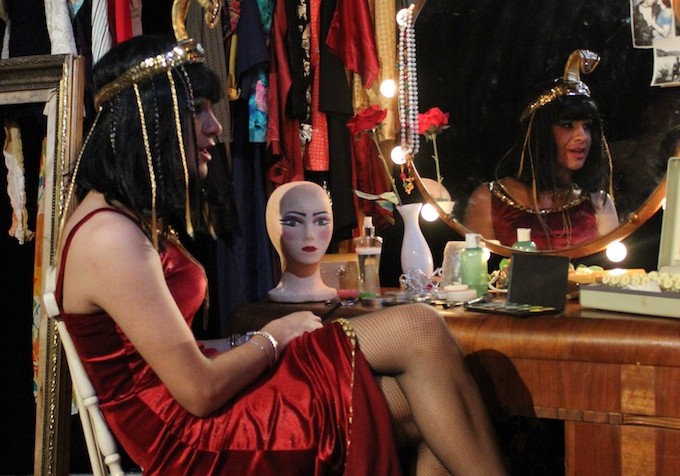The ’70s were a time of societal progress; Quebec’s Quiet Revolution irrevocably altered the political and civil landscape, giving members of the LGBTQ community a foothold in metropolitan life which they had previously been denied. It is at this time of great socio-political upheaval that the title character in Michel Tremblay’s Hosanna reaches the height of her tumultuous journey of self-discovery.
McGill’s Tuesday Night Café (TNC) Theatre’s production of Hosanna, directed by Scott Leydon, is an admirable telling of one of Tremblay’s most famous pieces. The script, controversial at the time of its conception, incorporates mature themes and language without giving way to cheap vulgarity. Although Tremblay’s style is monologue-heavy and driven by indirect action, a method most famously employed by Anton Chekhov, it refuses to become too wordy and has the ability to keep the audience hooked.
The intricate tale explores gender and sexual identity, centring on Hosanna, a drag queen ardently devoted to Elizabeth Taylor, and Hosanna’s relationship with her husband Cuirette. The story, bitingly humourous at times yet also intensely thought-provoking, coupled with Leydon’s courageous choices as a director, make for a unique night at the theatre.
The role of Hosanna presents a challenge to any actor, amateur, or professional. Daniel Carter skillfully navigates the multi-faceted character, enabling the audience to truly sympathize with the person hiding behind the makeup and gaudy dresses. Gaining momentum in the second act, the most impressive aspect of Carter’s performance is his use of his body; the seductive swaying of his hips as he walks, and the way in which he holds his head high during moments of profound vulnerability reveal his commitment to the role. There were a few instances in which he could have slowed down his speech or held specific moments slightly longer to maximize the impact of Tremblay’s words, but Carter redeems himself with his noticeable investment in a role many actors would shy away from.
Rounding out the small cast is Cameron Oram, who plays Cuirette, Hosanna’s cigarette-smoking, motorcycle-riding husband. Oram’s commanding stage presence, paired with his characterization of Cuirette’s nostalgic biker, makes for a performance loaded with range and depth. The two leads play off each other beautifully, maintaining eye contact in critical moments and allowing each other the theatrical space to execute their personal dramaturgical choices. Oram’s ability to play up the contrast between his brusque character and Carter’s delicate Hosanna is just one of the nuances of this meritorious production.
The technical elements of this production also play an important role in recounting Tremblay’s tale of self-discovery. Chloe Bernert’s set design is reminiscent of a time capsule; Hosanna’s apartment is chock-full of ’70s furniture, right down to the animal print throw blanket and beaded curtain. The apartment is also representative of Hosanna herself: chintzy, yet undeniably warm. Jackson Humphrey’s lighting appropriately reflects the mood of each scene without overpowering the quaint theatre. A standout moment occurs during Hosanna’s monologue about Elizabeth Taylor, when the intensity and direction of Humphrey’s design effectively help to bring about the desired intimacy.
One of the most pleasing aspects of Tremblay’s story is its ability to transcend time and to continue to be relevant today. Leydon’s ability to make this unconventional story so accessible to audience members, including a cheeky reference to the recent flood, is highly commendable. The bold choices made by both the actors, as well as the technical team, boil down to a triumph for student theatre.
Hosanna runs until Feb. 16 at the Tuesday Night Café Theatre (Morrice Hall, 3485 rue McTavish). Student admission $6.









